
Top 8 Free Alternatives to Typeform for 2025
Beyond Typeform: Unleash the Power of Free Form Builders
Need a free alternative to Typeform? This listicle presents eight powerful form builders perfect for freelancers, marketers, event planners, HR professionals, researchers, and more. Discover free tools that help capture leads, boost conversions, manage registrations, collect applications, and conduct surveys. Explore the features, pros, and cons of BuildForm, Google Forms, Jotform, Tally, Formspree, Formstack Forms (Free Plan), Cognito Forms, and 123FormBuilder to find the perfect Typeform alternative for your needs.
1. BuildForm
Looking for a free alternative to Typeform that doesn't compromise on features or power? BuildForm is an AI-powered, no-code form builder meticulously crafted to help teams of all sizes – from solopreneurs to enterprise-level organizations – capture leads, elevate engagement, and skyrocket conversions. This platform allows you to effortlessly create unlimited conversational forms, including surveys, order forms, event registrations, and more, in mere minutes. Whether you're a freelancer looking to streamline your client onboarding process, a marketer seeking deeper engagement with your audience, or an HR professional managing complex recruitment campaigns, BuildForm offers a flexible and robust solution.
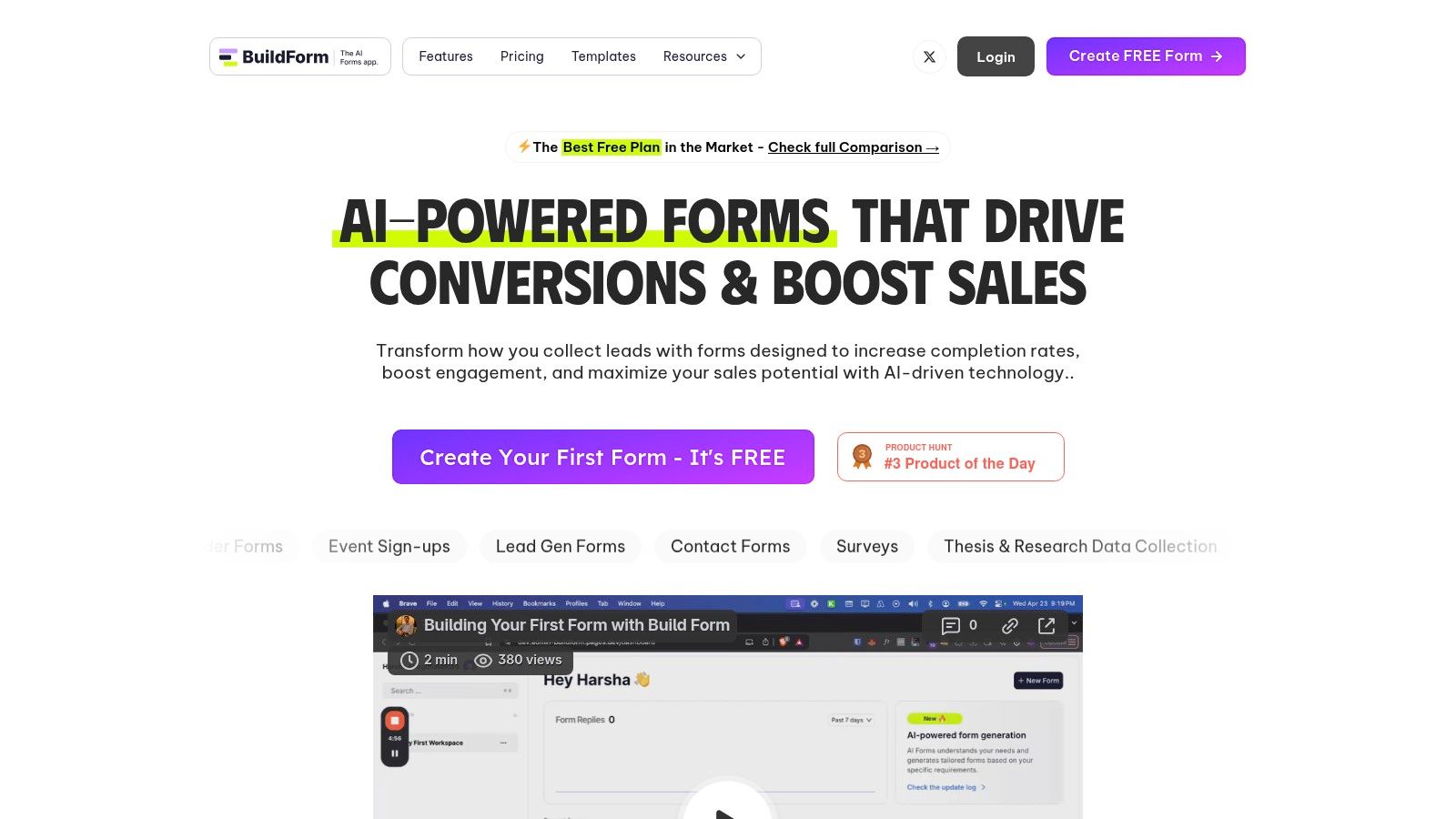
What truly sets BuildForm apart is its integrated AI engine, DeepOptimize. This innovative feature continuously analyzes user behavior in real-time, dynamically reordering questions and streamlining inputs to minimize friction and form fatigue. Imagine a form that learns as it's being filled out, adapting to individual user interactions to provide a smoother, more personalized experience. DeepOptimize even triggers timely nudges, like progress updates, to encourage completion and reduce drop-off rates. On the backend, this powerful engine provides actionable insights, highlighting high-friction questions and suggesting smarter logic paths, allowing you to continuously refine your forms for optimal performance. Learn more about BuildForm to see how its AI-driven approach sets it apart from the competition.
BuildForm offers a generous free plan that includes unlimited forms and submissions, making it an ideal choice for freelancers and small teams. This allows you to experience the core functionality and power of the platform without any financial commitment. As your needs grow, BuildForm scales effortlessly with flexible pricing plans to accommodate larger teams and more demanding projects. These plans unlock advanced features like multi-file uploads, enhanced integration options, and custom branding capabilities.
For marketing and sales teams, BuildForm becomes a powerful lead generation tool, offering seamless integration with popular CRM platforms. Event planners can simplify registration processes and gather valuable attendee information, while HR professionals can streamline recruitment and collect employee feedback with ease. Researchers and educators can leverage BuildForm's robust survey capabilities to gather data and analyze responses efficiently. The possibilities are truly endless.
Implementation is straightforward, thanks to BuildForm's intuitive interface and no-code design. Embedding forms on your website requires just a single line of code, making it easily accessible even for those without technical expertise. The platform also boasts seamless integrations with productivity tools like Slack, Notion, and Google Sheets, streamlining workflows and automating data capture. This robust connectivity allows you to centralize information and collaborate effectively with your team.
Pros:
- DeepOptimize AI engine: Dynamically improves form completion rates by adapting questions and UX in real-time.
- Generous free plan: Unlimited forms and submissions for individuals and small teams.
- Robust integrations: Streamlines workflows and automates lead capture with tools like Slack, Notion, Google Sheets, and major CRM platforms.
- Enterprise-ready features: API access, file uploads, custom branding, and 99.9% uptime guarantee for scalability and reliability.
- Insightful backend analytics: Provides actionable data for continuous optimization.
Cons:
- Some advanced features, like multi-file uploads and certain integrations, require a paid plan.
- Users transitioning from simpler form builders might experience a slight learning curve to fully utilize the AI-powered optimization and conditional logic.
BuildForm goes beyond being just a free Typeform alternative; it’s a powerful tool that leverages AI to create more engaging, more effective forms. Its robust features, generous free plan, and commitment to continuous optimization make it an excellent choice for anyone looking to enhance data collection and boost conversions. Visit the BuildForm website at https://buildform.ai to explore its capabilities and revolutionize your form-building process.
2. Google Forms: A Versatile Free Alternative to Typeform
Google Forms stands out as a robust and completely free alternative to Typeform, offering a compelling suite of features for various applications. As part of the Google Workspace ecosystem, it's a readily accessible and powerful tool for collecting information, conducting surveys, creating quizzes, and more. Its intuitive interface and seamless integration with other Google services make it a particularly attractive option for freelancers, solopreneurs, marketing teams, event planners, HR professionals, educators, and researchers looking for a scalable and user-friendly solution. If you're searching for a free alternative to Typeform, Google Forms is definitely worth exploring.
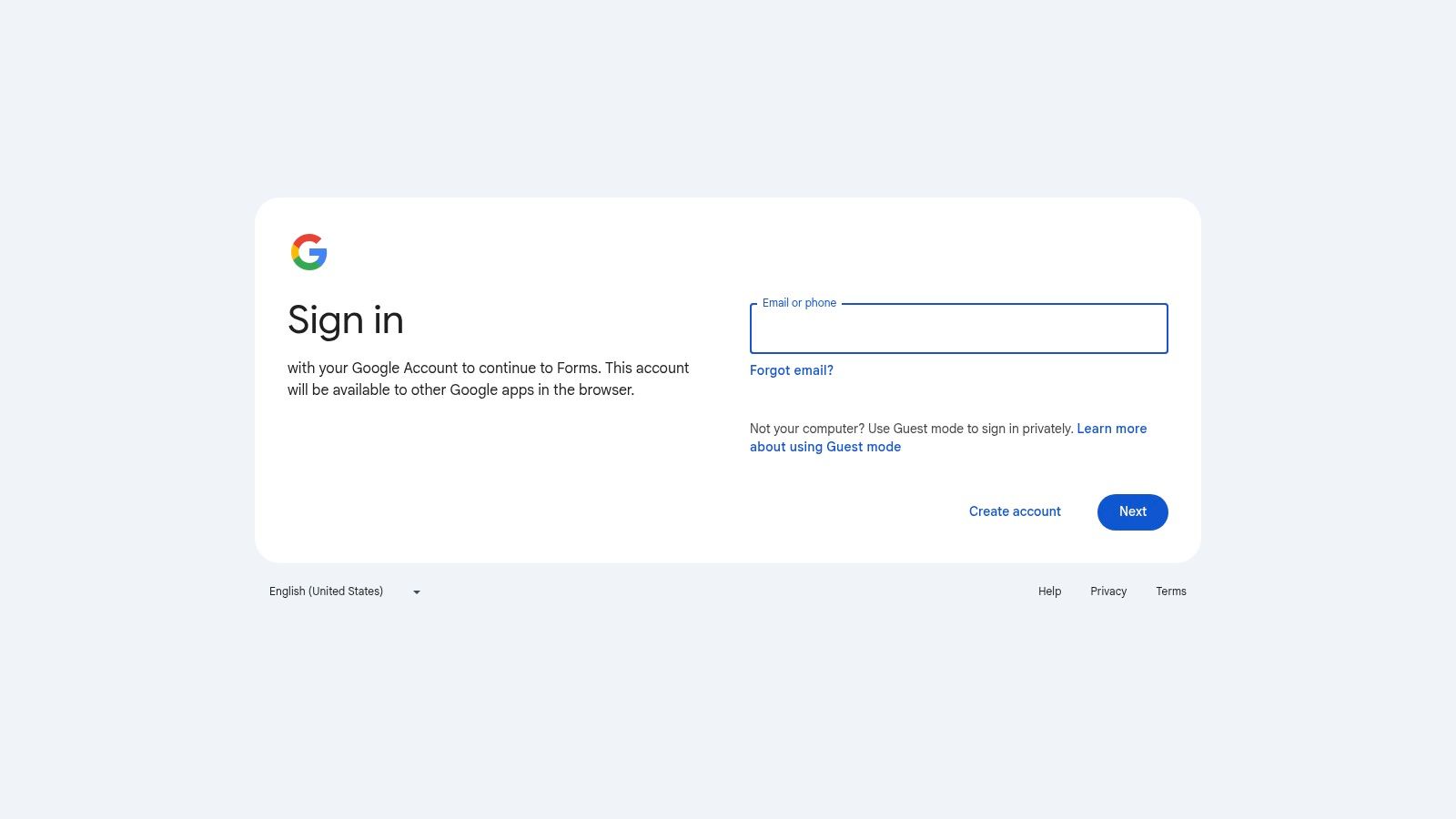
One of the key advantages of Google Forms is its versatility. Whether you need a simple contact form for your website, a detailed customer feedback survey, an engaging quiz for your students, or a registration form for an upcoming event, Google Forms can handle it all. The drag-and-drop form builder simplifies the creation process, allowing you to easily add various question types, including multiple choice, short answer, paragraphs, checkboxes, dropdown menus, linear scales, and file uploads. This flexibility makes it adaptable to a wide range of data collection needs.
For marketing and sales teams aiming to boost conversions and engagement, Google Forms offers a straightforward way to generate leads, gather customer insights, and conduct market research. Its seamless integration with Google Sheets allows for real-time response collection and automatic data organization, enabling efficient data analysis and reporting. Imagine effortlessly creating a lead capture form embedded directly on your website, with all submissions automatically populating a Google Sheet for immediate follow-up. This streamlines the lead nurturing process and facilitates targeted marketing campaigns.
Event planners and organizers can leverage Google Forms to simplify event registration and manage sign-ups efficiently. The platform's ability to collect various types of information, including contact details, dietary restrictions, and preferred session choices, makes it an ideal tool for organizing complex events. Furthermore, the real-time response collection allows organizers to track registrations and manage attendance effectively. The data can be easily exported to other applications for further processing or integrated with email marketing platforms to send automated confirmations and reminders.
HR and recruitment professionals will also find Google Forms invaluable for streamlining their processes. From collecting job applications and conducting candidate screenings to gathering employee feedback and conducting performance reviews, Google Forms offers a secure and efficient way to manage various HR tasks. The platform's data security features ensure the confidentiality of sensitive information, making it a trustworthy tool for handling HR-related data.
In the realm of education and research, Google Forms provides a powerful platform for conducting surveys, collecting data, and creating interactive quizzes. Educators can use it to assess student learning, gather feedback on course content, and create engaging assessments. Researchers can leverage its capabilities to collect survey responses, conduct experiments, and gather data for various research projects. The collected data can be easily analyzed and visualized using Google Sheets or other data analysis tools.
While Google Forms excels in its versatility and ease of use, it does have some limitations. Design customization options are somewhat basic compared to premium alternatives like Typeform. While you can customize themes, colors, and add images and videos, the level of design control is not as extensive. Similarly, the built-in analytics and reporting features are relatively basic, offering limited insights compared to dedicated analytics platforms. Learn more about Google Forms to improve your form design practices.
Despite these limitations, the fact that Google Forms is completely free with unlimited forms and responses makes it an incredibly valuable tool, particularly for those on a budget. Its seamless integration with the Google Workspace ecosystem, ease of sharing and real-time collaboration, and automatic data backup and cloud storage further enhance its appeal. If you're looking for a free alternative to Typeform, Google Forms is an excellent choice that delivers robust functionality and ease of use. Its practicality, affordability, and integration within the Google ecosystem make it a worthwhile addition to any individual's or organization's toolkit.
3. Jotform
Looking for a robust and versatile free alternative to Typeform? Jotform is a compelling contender that deserves serious consideration. It offers a comprehensive suite of form-building tools within a generous free tier, making it accessible to individuals and small businesses alike. Whether you're a freelancer collecting leads, a marketer boosting engagement, or an event planner managing registrations, Jotform provides a flexible and powerful platform to streamline your data collection processes. Its intuitive drag-and-drop interface, combined with a vast library of templates and integrations, empowers users of all technical levels to create professional and effective forms. Jotform shines where Typeform's free version falls short, offering a wider breadth of features and significantly more submissions per month. This makes it a particularly attractive option for users who anticipate moderate to high volumes of responses.
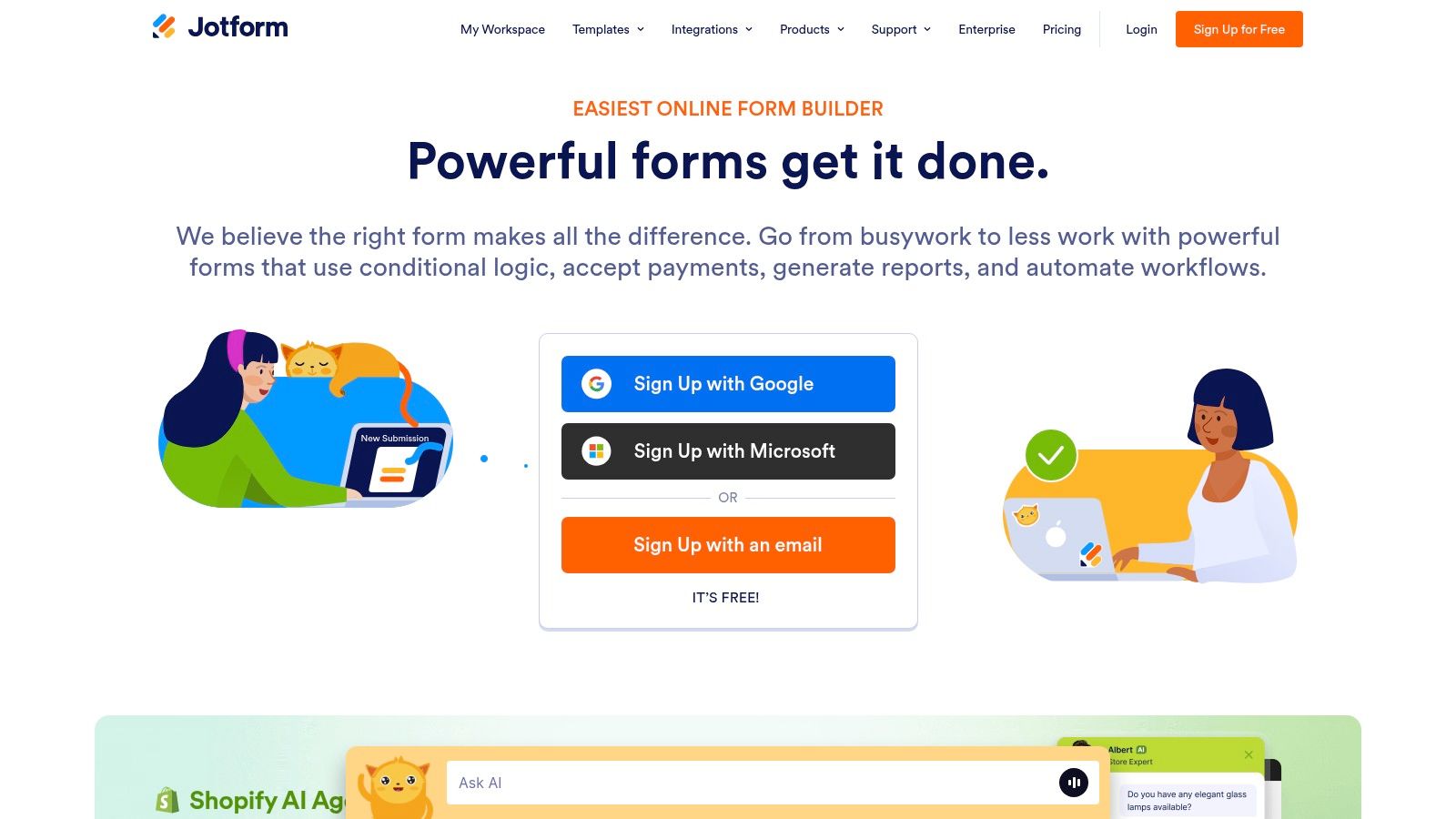
One of Jotform’s key strengths is its extensive template library. With over 10,000 pre-built templates categorized by industry and use case, you can quickly find a starting point for virtually any form type. Need a contact form for your website? Looking for a registration form for your upcoming webinar? Jotform has you covered. These templates are not just static starting points either; they are fully customizable. Using the drag-and-drop interface, you can easily add, remove, or modify form elements, tailor the design to match your branding, and implement advanced features like conditional logic and calculations. This level of customization makes Jotform suitable for a wide range of applications, from simple lead capture forms to complex multi-page surveys.
For power users seeking more sophisticated functionality, Jotform offers a range of advanced features usually found in premium form builders. Conditional logic allows you to create dynamic forms that adapt based on user input. For instance, you can show or hide specific fields based on previous answers, creating a more personalized and efficient user experience. Calculations enable you to perform real-time calculations based on user input, useful for order forms, quizzes, or surveys with scoring systems. Furthermore, Jotform’s robust workflow automation capabilities streamline data processing and integration with other business tools.
Jotform also excels in its integration capabilities. It connects seamlessly with over 100 popular third-party applications, including CRM platforms, email marketing services, payment gateways, and cloud storage solutions. This allows you to automate data transfer, eliminate manual data entry, and create a more cohesive workflow across your various business tools. For example, you can automatically add new leads captured through a Jotform form to your email marketing list or CRM database. This level of integration streamlines your operations and maximizes the value of the data you collect.
The free plan offers a generous allowance of 5 forms, 100 submissions per month, and 100MB of storage. While the submission limit may not be sufficient for high-volume users, it provides ample capacity for many freelancers, solopreneurs, and small businesses. Jotform’s comprehensive documentation and excellent customer support also contribute to a positive user experience, making it easy to get started and troubleshoot any issues that arise.
While Jotform is a powerful and versatile tool, it's essential to consider its limitations. The free plan's submission limits might be restrictive for some users. Additionally, certain advanced features, such as HIPAA compliance and unlimited submissions, are only available on paid plans. Finally, the sheer breadth of features and customization options can feel overwhelming for users who only need basic forms. Jotform branding on free forms is another minor drawback.
Despite these minor drawbacks, Jotform presents a compelling free alternative to Typeform, particularly for users who value customization, integrations, and a generous free tier. Its extensive features, ease of use, and comprehensive template library make it a valuable tool for anyone looking to streamline data collection and improve efficiency. Visit the Jotform website (https://www.jotform.com) to explore its features and discover how it can empower your data collection efforts.
4. Tally
Tally stands out as a compelling free alternative to Typeform, offering a modern and user-friendly form-building experience without the constraints of paid plans. It’s designed to be intuitive and visually appealing, enabling users to create professional-looking forms quickly and easily, even without a dedicated design budget. This makes it a particularly attractive option for freelancers, solopreneurs, and small businesses looking for powerful form-building capabilities without the recurring cost. What sets Tally apart is its commitment to providing unlimited forms and responses even on its free tier, eliminating a significant barrier often encountered with other form builders. This unlimited access allows users to scale their lead generation, customer feedback collection, and data gathering efforts without worrying about hitting usage limits.
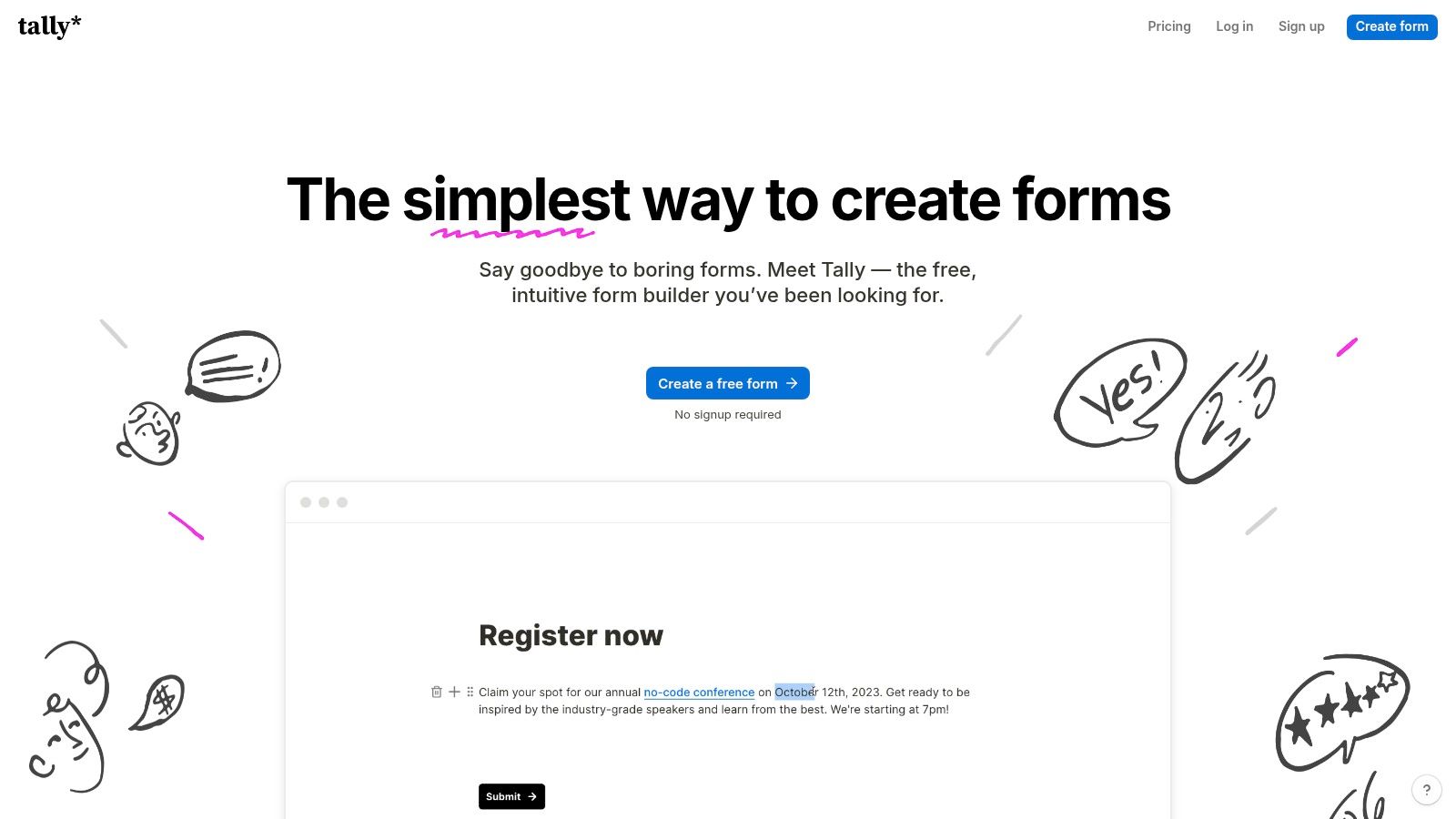
For freelancers and solopreneurs, Tally's free tier provides a scalable solution for building landing pages with embedded forms, capturing leads for newsletters or services, and gathering client feedback. Imagine a freelance web designer using Tally to create a beautiful contact form directly on their portfolio site or a consultant gathering project requirements through a detailed questionnaire – all without incurring any platform fees.
Marketing and sales teams can leverage Tally to boost conversions and engagement. Think about creating interactive quizzes to qualify leads, designing eye-catching surveys to understand customer preferences, or building engaging contest entry forms. The flexibility of unlimited forms allows for A/B testing different form designs and question types to optimize conversion rates. This makes Tally a powerful tool for driving leads and gathering valuable market insights.
Event planners and organizers will find Tally particularly useful for managing registrations and sign-ups. From small workshops to large conferences, Tally enables the creation of streamlined registration forms with conditional logic, allowing for personalized attendee experiences. For example, attendees could be automatically assigned to different breakout sessions based on their responses to specific questions. The ability to collect payments directly through forms further simplifies event management logistics.
HR and recruitment professionals can use Tally to create engaging application forms, collect employee feedback, and manage training evaluations. The platform's focus on user experience ensures a positive candidate experience, while features like file uploads enable the seamless collection of resumes and portfolios. This streamlined approach improves efficiency and reduces administrative burden.
Researchers and educators can also benefit from Tally’s capabilities for conducting surveys and collecting data. Its user-friendly interface makes it easy to create surveys for various research purposes, from academic studies to market research. The integration with tools like Google Sheets simplifies data analysis and reporting.
Tally's clean, modern interface is reminiscent of Typeform, making it easy for users familiar with that platform to transition. The absence of Tally branding on forms, even on the free plan, ensures a professional presentation. Advanced question types, including file uploads, payment collection, and calculations, add to its versatility. Integration with popular tools like Notion, Airtable, Google Sheets, and Zapier further extends its functionality, allowing users to automate workflows and connect their data seamlessly.
While Tally is a relatively new platform with a smaller community compared to some established competitors, its commitment to a robust free plan and its focus on user experience make it a strong contender in the form-building space. Setting up a form is intuitive; simply navigate to tally.so, create an account (also free), and begin building your form. While it has fewer integrations than more mature platforms and some advanced customization options might be limited, the core features offered in the free tier are more than sufficient for a wide range of use cases. The platform's focus on simplicity and continuous development makes it a promising free alternative to Typeform, especially for those who value unlimited forms and responses without compromising design or functionality.
5. Formspree
Formspree presents a compelling free alternative to Typeform, especially for developers and designers seeking granular control over their forms' appearance and functionality. While Typeform excels with its visually appealing drag-and-drop interface, Formspree empowers users with code-centric customization, making it ideal for those comfortable with HTML. This makes Formspree a robust option for freelancers and solopreneurs, marketing teams, and even developers looking for rapid prototyping of forms within existing sites. If you need a simple contact form, lead magnet delivery system, or a way to collect registrations without delving into server-side code, Formspree is worth considering.
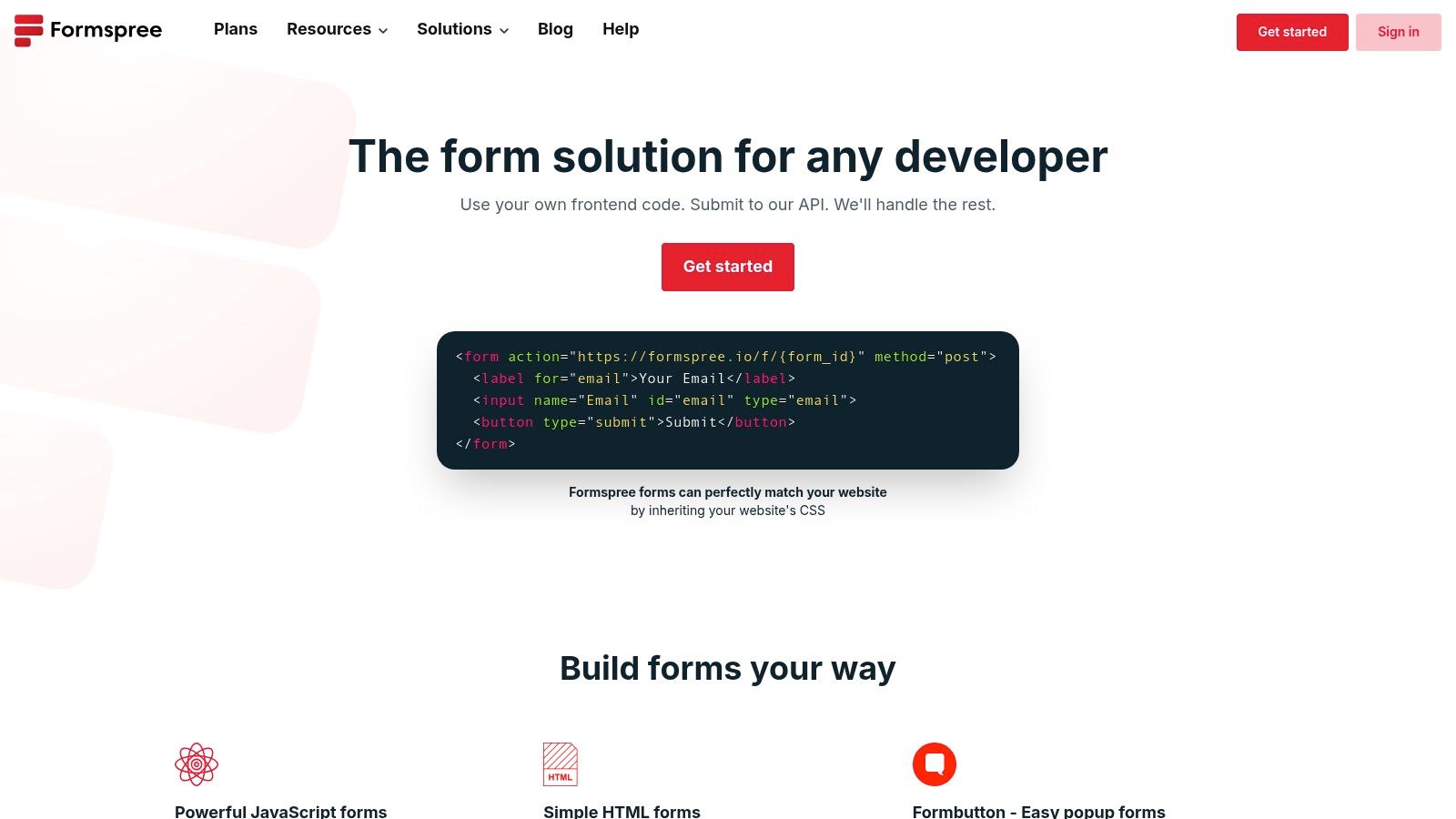
One of Formspree's primary strengths lies in its straightforward integration. Simply create an HTML form, point the action attribute to Formspree's endpoint, and you're essentially done. No backend setup, databases, or server-side scripting required. This is particularly beneficial for static websites built with tools like Jekyll, Gatsby, or Hugo, where adding dynamic functionalities can be more complex. Event planners using simple landing pages for registrations, or HR professionals collecting feedback via a basic form embedded on the company intranet, would find Formspree’s ease of integration a significant advantage.
For developers, the ability to manipulate the form's design using CSS provides unparalleled flexibility. Unlike drag-and-drop builders that often constrain customization options, Formspree allows pixel-perfect implementation of branding and design guidelines. Marketing and sales teams can create forms seamlessly integrated with their website’s aesthetic, boosting brand consistency and potentially improving conversion rates. Furthermore, developers can integrate Formspree with other tools and services using webhooks. For example, you can connect your form submissions to a CRM, email marketing platform, or even a spreadsheet for data analysis. This flexibility makes Formspree a valuable tool for scaling lead-capture efforts and automating workflows.
While the free tier allows for 50 submissions per month, which is sufficient for low-traffic sites or initial testing, heavier usage requires a paid subscription. This limit might be restrictive for researchers conducting large-scale surveys or marketing teams managing high-volume lead generation campaigns. Compared to Typeform’s free plan, which limits the number of forms and questions rather than submissions, Formspree’s model might be less appealing for those expecting a high number of responses.
For non-technical users, Formspree's reliance on HTML can present a learning curve. Though the basic setup is simple, creating visually appealing forms requires HTML and CSS knowledge. This puts it at a disadvantage compared to Typeform’s intuitive drag-and-drop interface, which requires no coding experience. However, numerous free online resources and HTML templates are readily available to assist less technical users in building functional forms.
Another area where Formspree falls short compared to Typeform is built-in analytics and reporting. While Formspree provides basic submission management, it lacks the detailed analytics and reporting features offered by Typeform. For users requiring in-depth data analysis, integrating Formspree with third-party analytics tools or leveraging webhook functionality for custom data processing might be necessary.
In summary, Formspree (https://formspree.io) stands out as a free alternative to Typeform for those prioritizing design control and simple integration, particularly for developers and designers. Its ease of use for static sites and code-based customization makes it a powerful tool. However, limitations in the free tier's submission limits, the code-oriented approach, and limited built-in analytics might make it less suitable for non-technical users or those needing extensive reporting features. By understanding its strengths and weaknesses, users can determine if Formspree is the right tool for their specific form-building needs.
6. Formstack Forms (Free Plan)
If you're searching for a free alternative to Typeform, and require a robust, enterprise-grade form builder, Formstack Forms might be a worthwhile option to explore, especially if security and advanced integrations are paramount. While the free plan has limitations, it offers a glimpse into the powerful features of Formstack's premium offerings, making it suitable for small projects, pilot tests, or simply getting a feel for the platform before committing to a paid subscription. This positions Formstack as a solid choice for users seeking a free Typeform alternative with a focus on professional features and robust functionality. This is especially true for those anticipating future scaling and the need for more advanced functionalities down the line.
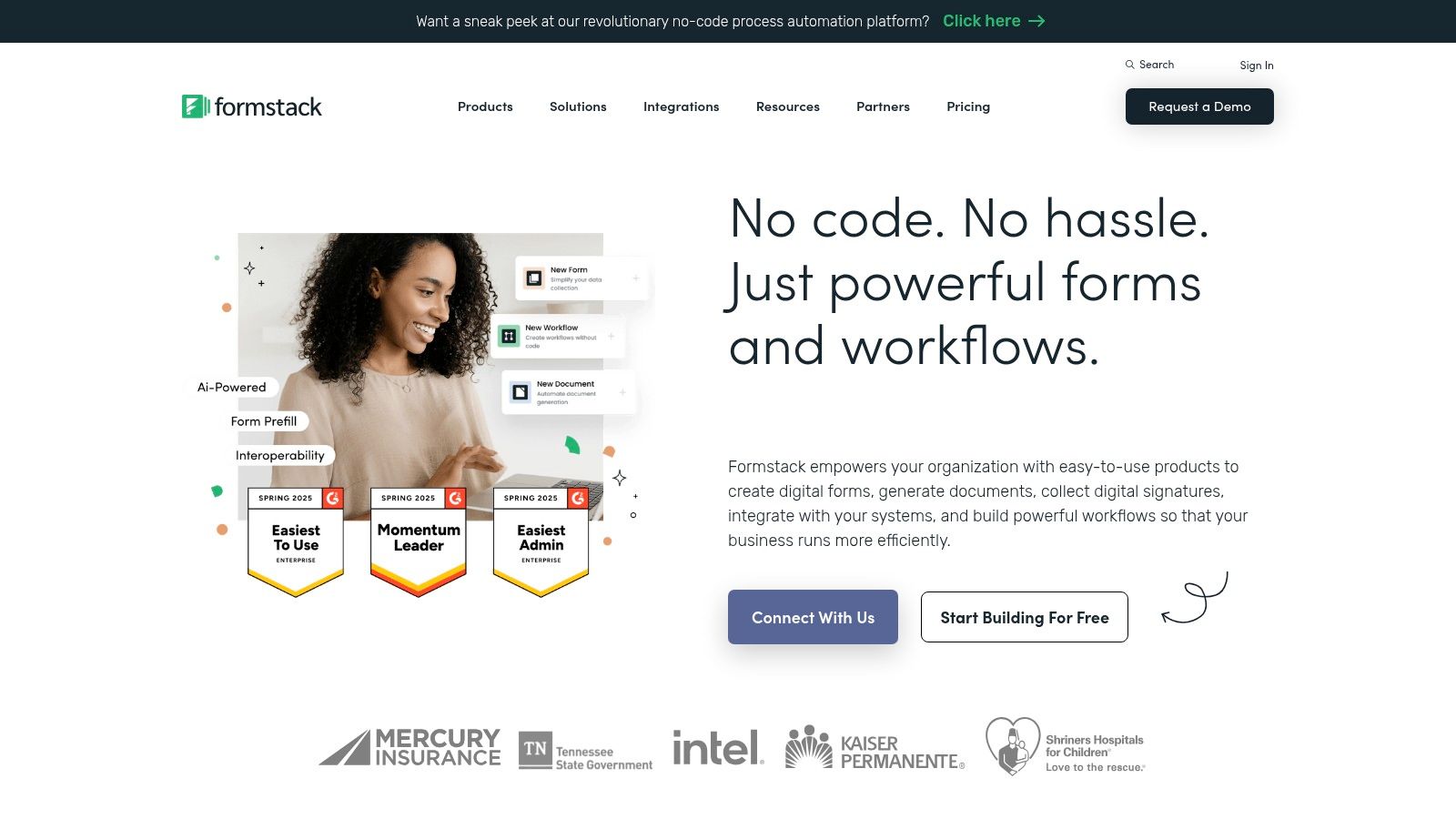
Formstack distinguishes itself from other free form builders with its emphasis on security and compliance. This makes it an excellent option for handling sensitive data, like in healthcare or finance, even on the free tier. It also boasts advanced features like conditional logic, payment integration, and file uploads, features often missing in completely free alternatives to Typeform. Imagine needing to collect client signatures for contracts, processing payments for online courses, or managing complex application forms with branching logic – Formstack’s free plan can handle these scenarios, albeit within the limits of its free tier.
For freelancers and solopreneurs just starting out, the free plan offers a way to create professional-looking lead capture forms with CRM integration. While the 10 submissions per month limit might seem restrictive, it can be sufficient for initial lead generation efforts or for A/B testing different form designs and field configurations before upgrading to a paid plan for higher volume.
Marketing and sales teams can leverage Formstack’s powerful integrations to streamline their workflows. Connecting forms directly with CRM and email marketing platforms automates the process of capturing leads, segmenting audiences, and nurturing prospects. Event planners will appreciate the mobile-optimized forms and the ability to collect registrations and manage attendee information efficiently. While the free plan's limitations might not be ideal for large-scale events, it serves as an effective tool for smaller gatherings or as a testing ground for larger projects before upgrading.
HR and recruitment professionals can utilize Formstack for collecting job applications, feedback surveys, and employee onboarding forms. The advanced field types, like file uploads for resumes and signatures for agreements, combined with secure data handling, make it a suitable solution for HR processes. Researchers and educators can use Formstack's capabilities to design surveys, quizzes, and feedback forms, taking advantage of the conditional logic to tailor questions based on previous responses.
The drag-and-drop interface and pre-built templates make form creation relatively intuitive, even for those without technical expertise. However, the extensive features and integration options can lead to a steeper learning curve when delving into more advanced functionalities. It's advisable to start with the basics and progressively explore the more complex features as needed.
One of the major drawbacks of the Formstack free plan is its limitation to a single form and only 10 submissions per month. This makes it unsuitable for high-volume data collection or projects requiring multiple forms. Compared to other free Typeform alternatives, this is a significant restriction. However, the professional-grade features offered in the free tier make it a valuable tool for testing and smaller projects. The paid plans offer much greater flexibility but come at a significantly higher cost compared to some alternatives.
Key Takeaways:
- Pricing: Free plan available (1 form, 10 submissions/month). Paid plans start at a higher price point compared to other alternatives.
- Technical Requirements: No specific technical requirements. Accessible via a web browser.
Formstack Forms (Free plan) is a potent free alternative to Typeform if you prioritize professional features, security, and integrations. While the limited submissions might be a constraint, the free tier offers substantial value for smaller projects, testing, and familiarization with the platform’s capabilities. If you foresee your form needs growing, exploring the paid plans might be necessary, but the free version serves as an excellent starting point. You can access Formstack Forms at https://www.formstack.com.
7. Cognito Forms
If you're searching for a robust free alternative to Typeform, Cognito Forms deserves serious consideration. This powerful online form builder offers a surprising array of advanced features, typically found only in premium tools, yet provides a generous free tier perfect for a range of applications. Whether you're a freelancer collecting leads, a marketing team boosting engagement, or an event planner managing registrations, Cognito Forms can streamline your workflow without breaking the bank. It’s a compelling option for anyone needing more than just basic form creation.
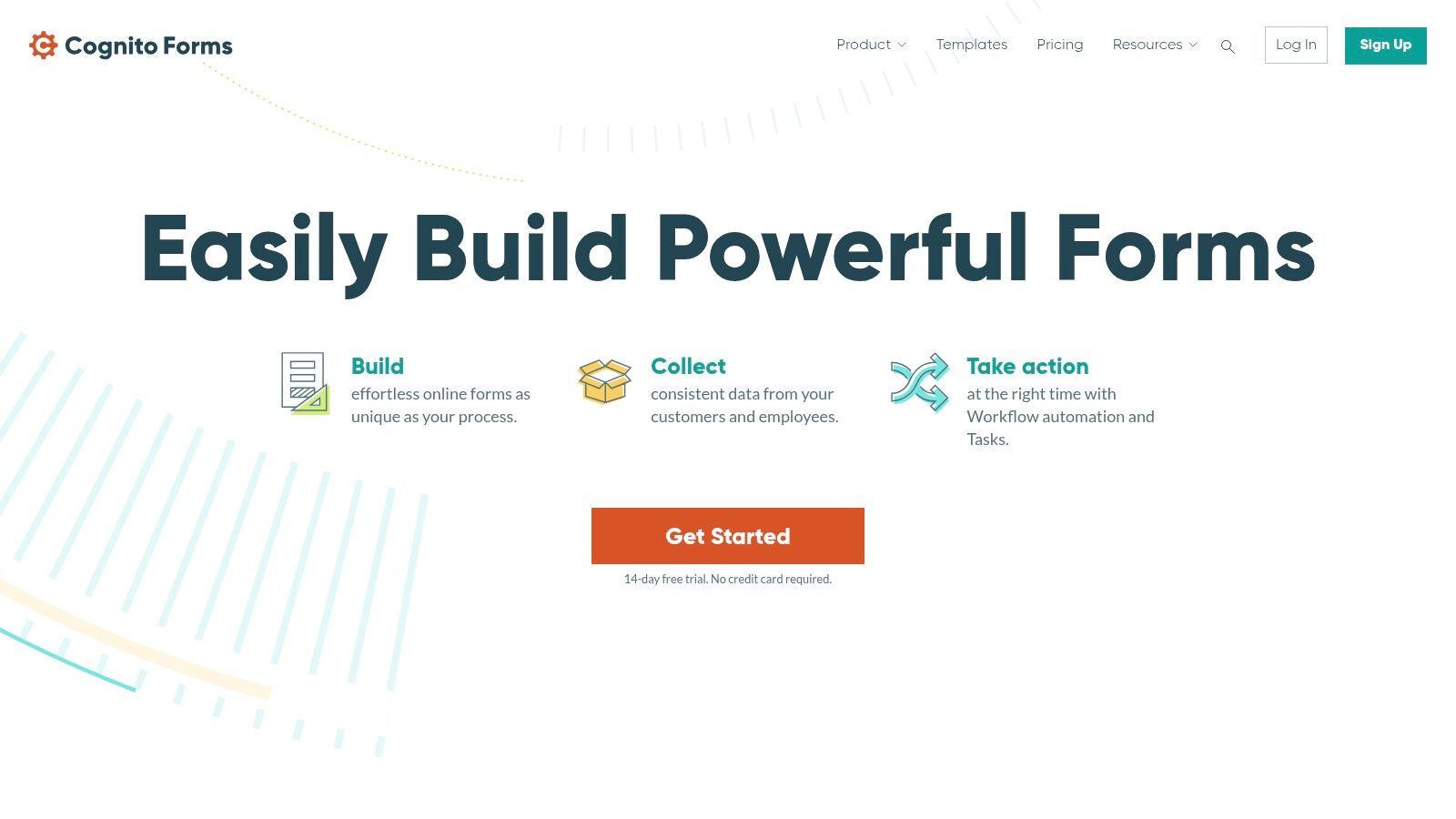
Cognito Forms excels at handling complex form requirements thanks to features like advanced calculations, conditional logic, and even payment processing integration, all available within the free plan. This makes it a viable alternative to Typeform, especially for users who need these advanced functionalities without the associated costs. Imagine calculating discounts on an order form in real-time or dynamically adjusting questions based on previous responses – all without needing to upgrade to a paid plan.
The free plan's generosity is noteworthy, allowing unlimited forms, 500 entries per month, and 1GB of storage. This is particularly attractive for freelancers and solopreneurs who may require multiple forms for different projects but have limited budgets. For instance, a freelance graphic designer could use Cognito Forms for client questionnaires, project proposals, and feedback forms, all within the free allowance. Similarly, a small business owner could implement order forms, customer satisfaction surveys, and even event registrations, all without incurring subscription fees.
Let’s dive deeper into the features that make Cognito Forms stand out:
- Advanced Calculations: Perform complex mathematical operations within your forms. This is invaluable for order forms, registrations with varying pricing tiers, or surveys requiring score calculations.
- Conditional Logic: Create dynamic forms that adapt based on user responses. Show or hide fields, redirect users to different pages, or personalize the experience based on their input. This feature is particularly useful for creating efficient and user-friendly applications and registrations.
- Payment Processing: Seamlessly integrate with Stripe and PayPal to accept payments directly through your forms. This streamlines the order process and reduces friction for customers, a significant advantage for businesses selling products or services online.
- File Uploads: Allow users to upload files directly through the form, with built-in virus scanning and storage management features. This is ideal for collecting applications, portfolio submissions, or any situation requiring document uploads.
- Analytics and Reporting: Gain insights into form performance with detailed analytics and custom reporting capabilities. Track submission rates, identify trends, and optimize your forms based on real-time data.
While Cognito Forms provides a compelling free alternative to Typeform, it’s essential to be aware of its limitations:
- Complex Interface: The platform’s powerful features come with a steeper learning curve compared to more simplistic form builders. Beginners might find the interface a little overwhelming initially.
- Limited Design Customization: While functionality is prioritized, design customization options are somewhat limited compared to competitors. You might find less flexibility in terms of branding and visual aesthetics.
- Fewer Integrations: Cognito Forms offers fewer third-party integrations compared to some alternatives, which might be a constraint for users heavily reliant on specific applications.
- Limited Free Support: While the free plan offers access to documentation and community forums, dedicated customer support is limited.
Getting started with Cognito Forms is straightforward. Simply create an account on their website (https://www.cognitoforms.com) and start building your forms. The platform offers a drag-and-drop interface and pre-built templates to simplify the process. Invest some time exploring the features and experimenting with the different options to fully utilize its capabilities.
In conclusion, Cognito Forms presents a valuable free alternative to Typeform, especially for users who prioritize advanced functionality and complex form requirements. The generous free plan, coupled with features like calculations, conditional logic, and payment processing, makes it a powerful tool for a diverse range of applications. While the interface might initially seem complex and design customization options are somewhat limited, the overall value proposition makes Cognito Forms a strong contender in the world of free form builders.
8. 123FormBuilder
123FormBuilder stands out as a robust and versatile free alternative to Typeform, offering a compelling blend of ease of use and powerful features. This platform empowers users to create a wide array of online forms, from simple contact forms to intricate surveys, applications, and even payment forms. It's an excellent choice for freelancers, solopreneurs, marketing teams, event planners, HR professionals, and researchers seeking a scalable and customizable form-building solution without the hefty price tag of premium alternatives. The platform's intuitive drag-and-drop interface makes it accessible to users with varying technical skills, allowing them to quickly design and deploy professional-looking forms.
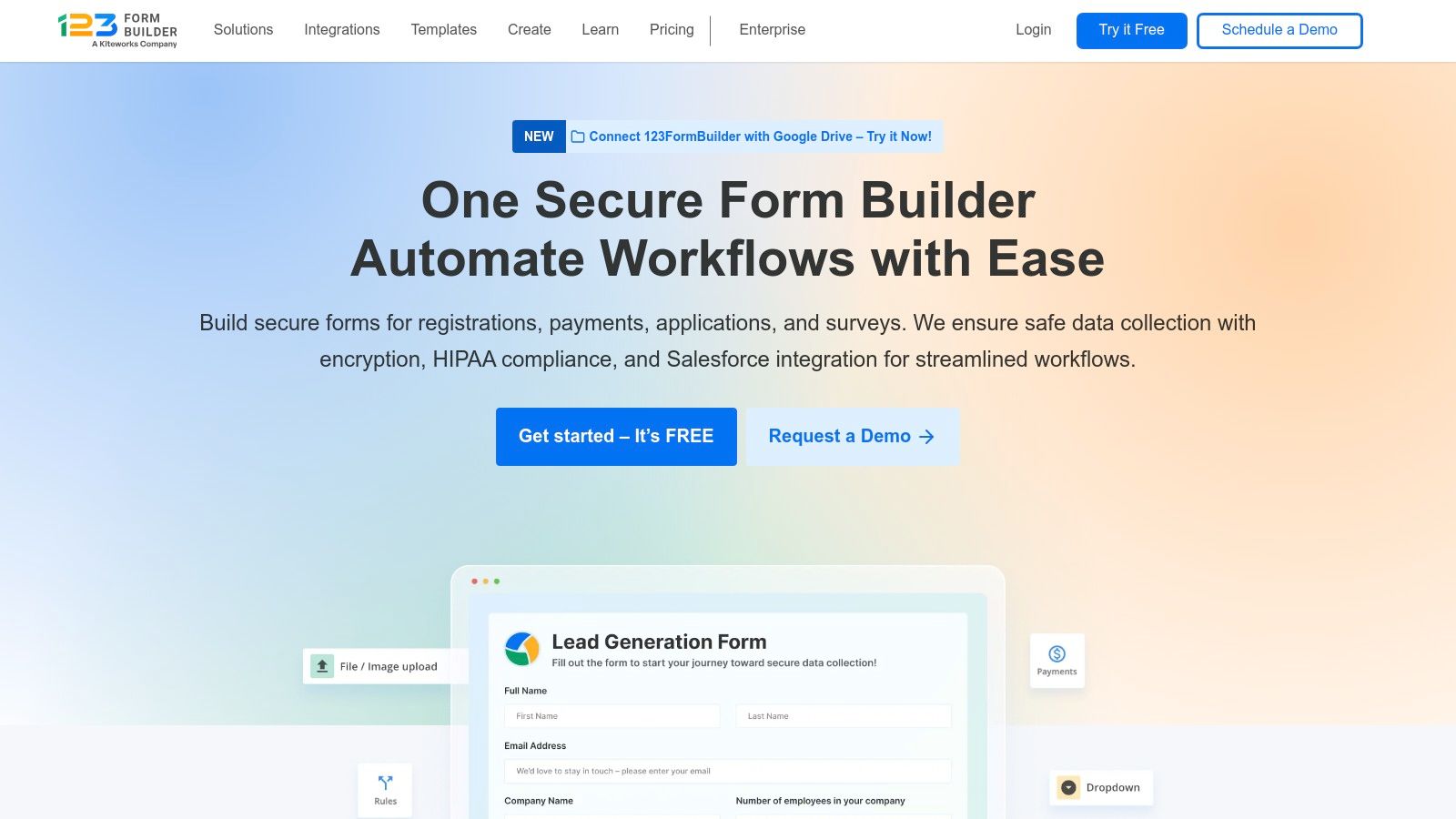
One of 123FormBuilder's key strengths lies in its generous free plan. Users can create up to five forms and collect up to 100 submissions per month with 1GB of storage. This makes it an ideal starting point for individuals and small businesses looking to test the waters or manage a moderate volume of form submissions. While the free plan does display 123FormBuilder branding on the forms, it provides access to a significant number of features, including over 40 field types, pre-designed templates, conditional logic, calculations, and basic form validation.
For marketing and sales teams, 123FormBuilder offers the capability to create engaging lead capture forms, feedback surveys, and even event registration forms. The platform’s integration with popular marketing automation platforms like Mailchimp allows for seamless lead nurturing and campaign management. Furthermore, integrations with payment gateways like PayPal facilitate the creation of order forms and online payments.
Event planners and organizers can leverage 123FormBuilder to streamline event registration processes. The platform's mobile-responsive design ensures that attendees can easily register from any device. Customization options allow for branding consistency, ensuring that the registration forms align seamlessly with the overall event aesthetic.
HR and recruitment professionals will find 123FormBuilder useful for collecting job applications, conducting employee surveys, and gathering feedback. The platform's data collection and reporting features provide valuable insights into applicant pools and employee sentiment.
Researchers and educators can utilize 123FormBuilder's advanced features, such as conditional logic and calculations, to design sophisticated surveys and quizzes. The platform's ability to export data in various formats simplifies data analysis and reporting.
While the free plan provides significant value, 123FormBuilder also offers paid plans for users requiring higher submission limits, advanced features, and the removal of branding. These plans unlock features such as file uploads, multi-page forms, and advanced reporting capabilities. Pricing scales based on the number of forms and submissions required, offering flexibility for businesses of all sizes.
Setting up 123FormBuilder is straightforward. The intuitive drag-and-drop interface allows users to quickly add and customize form fields. The platform offers a wide selection of pre-designed templates categorized by industry and use case, further simplifying the form creation process. Users can also customize the look and feel of their forms using custom CSS styling.
Compared to similar free form builders, 123FormBuilder stands out with its generous free plan and robust feature set. While some newer alternatives may offer a more modern interface design, 123FormBuilder’s mature platform and reliable customer support make it a dependable choice. The key drawback is the limited submission count on the free plan and the presence of branding, which may be a concern for users with high-volume needs or those requiring a completely unbranded experience. However, for many users, the benefits of 123FormBuilder's free plan far outweigh these limitations, making it a worthy free alternative to Typeform. You can explore 123FormBuilder and its features at https://www.123formbuilder.com.
Top 8 Free Typeform Alternatives Comparison
| Platform | Core Features & AI Optimization | User Experience & Quality ★★★★☆ | Value & Pricing 💰 | Target Audience 👥 | Unique Selling Points & Integrations ✨ |
|---|---|---|---|---|---|
| BuildForm 🏆 | AI-powered DeepOptimize, real-time UX adaptation | ★★★★★ Very high, dynamic optimizations | 💰Generous free plan, scalable pricing | 👥 Freelancers, marketers, enterprises | ✨ AI lead nurturing, rich analytics, major CRM & Slack integration |
| Google Forms | Basic drag/drop, logic branching, quiz features | ★★★☆☆ Simple, easy to use | 💰100% free | 👥 General users, Google Workspace users | ✨ Seamless Google ecosystem integration |
| Jotform | Drag/drop builder, conditional logic, 10,000+ templates | ★★★★☆ Strong customization | 💰Free tiers limited, paid plans needed | 👥 Small to medium businesses | ✨ Extensive templates, 100+ app integrations |
| Tally | Unlimited forms/responses, conditional logic | ★★★★☆ Modern, clean UI | 💰Free unlimited | 👥 Startups, creators needing design | ✨ No branding on free plan, simple & stylish |
| Formspree | Backend form service, no server code needed | ★★★☆☆ Basic UX, code-centric | 💰Free tier (50 submissions/mo) | 👥 Developers, designers | ✨ Easy HTML integration, webhook support |
| Formstack Forms (Free) | Professional templates, conditional logic, payment | ★★★☆☆ Enterprise-grade but complex | 💰Very limited free plan (1 form, 10 subs) | 👥 Enterprises, security-conscious | ✨ Strong security, workflow automation |
| Cognito Forms | Advanced calculations, payment processing | ★★★★☆ Powerful but complex interface | 💰Generous free plan (500 entries/mo) | 👥 Businesses needing complex forms | ✨ Payment + virus-scanned file uploads, detailed reporting |
| 123FormBuilder | Drag/drop builder, conditional logic, many templates | ★★★☆☆ User-friendly, less modern UI | 💰Free with branding and limits | 👥 Beginners & SMBs | ✨ Wide integrations (Mailchimp, Salesforce, PayPal) |
Choosing the Perfect Free Typeform Alternative
Finding the right free alternative to Typeform can significantly impact your data collection and lead generation efforts. From the simple elegance of Google Forms to the robust features of Jotform, Tally, and 123FormBuilder, and the AI-powered capabilities of BuildForm, there's a solution tailored to every need. We've also explored options like Formspree, Formstack Forms (Free Plan), and Cognito Forms, each offering unique strengths for different use cases. Remember, the best choice depends on the complexity of your forms, expected submission volume, budget constraints, and integration needs with other tools.
When implementing your chosen tool, consider factors like user experience, mobile responsiveness, and data analysis capabilities. For a deeper understanding of how your forms perform and to optimize conversion rates, consider integrating your chosen form builder with website analytics tools. This data-driven approach will help you refine your forms for maximum impact.
Selecting the right free alternative to Typeform allows you to streamline processes, gather crucial information, and ultimately, achieve your business objectives, whether it's boosting conversions, managing event registrations, or conducting research. Finding the perfect tool empowers you to connect with your audience and achieve your goals without the financial burden of premium software.
Ready to experience the power of AI-driven form creation without the premium price tag? BuildForm offers a compelling free alternative to Typeform, providing intuitive design and advanced features to elevate your data collection. Explore the possibilities and create your first form today with BuildForm.


